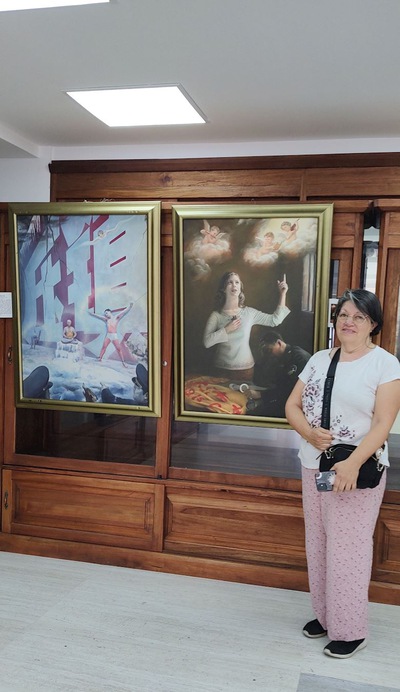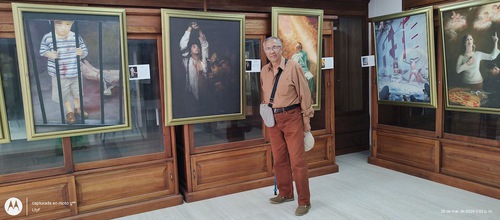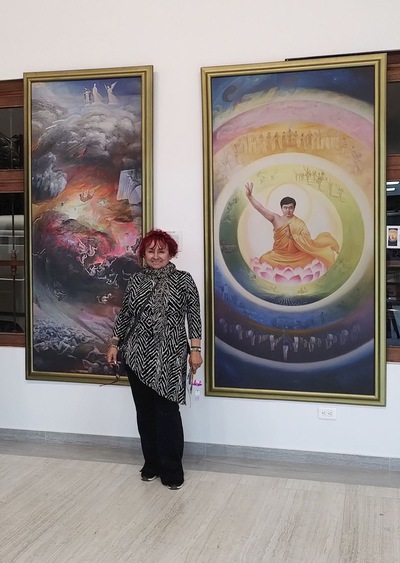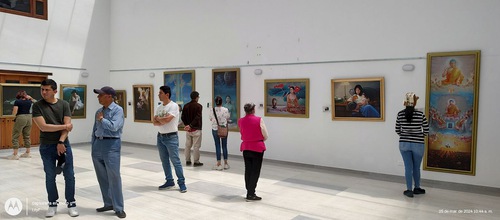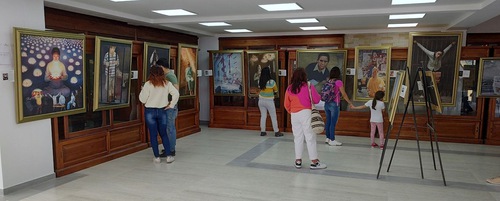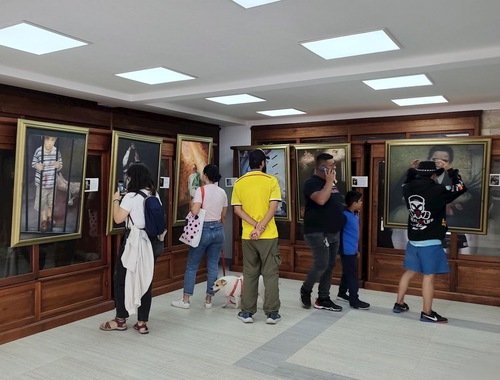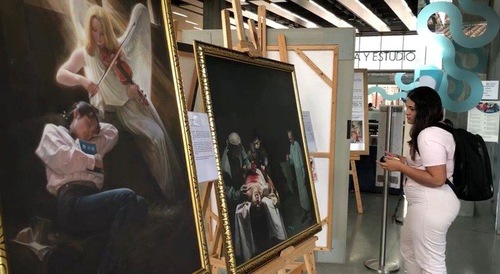Colombia: “The Art of Zhen Shan Ren” Moves Hearts in Two Cities
(Minghui.org) The Art of Zhen, Shan, Ren (Truthfulness, Compassion, Forbearance) Exhibition was held in two locations in Colombia between March 24, 2024 and April 20, 2024.
The small town of Sáchica and the city of Medellín had the privilege of hosting the painting collection, which moved thousands of Colombians over the past several years.
Exhibition in Sáchica Welcomed by the Mayor
Sáchica is a small village located in Boyacá, a province in the center of the country about 200 kilometers north of Bogotá (the capital city). With a population of approximately 4,000, it belongs to a deeply religious region where one can find such tourist attractions.
The Art of Zhen, Shan, Ren was presented by local Falun Dafa practitioners between March 24 and April 4, at the House of Culture. It was attended by more than 2,000 visitors, both locals and tourists. They had the opportunity to learn about the practice of Falun Gong and the persecution of the practice carried out by the Chinese communist regime since 1999.
Practitioners guided visitors through the exhibit and explained the background of each painting. They also shared brochures with information about practice sites for people who were interested in learning more about practicing Falun Dafa.
Engineer David Amado, mayor of the city of Sáchica, was moved by the human rights violations in China and said he had no knowledge of it. He expressed his gratitude for the possibility that through the exhibition, both residents and tourists would learn about this terrible situation.
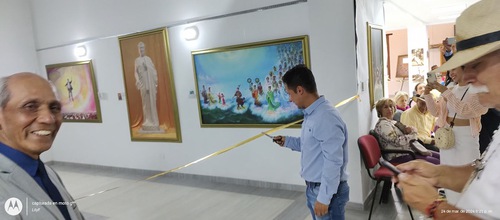 The mayor of Sáchica, David Amado, cuts the opening ribbon of the exhibition.
The mayor of Sáchica, David Amado, cuts the opening ribbon of the exhibition.
He was shocked by how the Chinese Communist Party (CCP) uses practitioners as a primary source for forced organ harvesting, saying, “It is something frightening, and very difficult to comprehend since here we all enjoy respect for spirituality and belief in God.”
Finally, he said he was grateful for the presence of the exhibition in his municipality, highlighting the beauty of the works and the transcendental nature of their theme. He invited the mayors of the surrounding municipalities to open the doors to these works, highlighting the importance of informing citizens about this persecution.
Educators Find Value in Art Pieces and Message
Several educators also viewed the exhibit in Sáchica, and praised the spiritual themes within many of the paintings.
Mary Trujillo is a professor of chemistry at the National University of Colombia, (the biggest and most recognized university in Colombia). She loves art and painting, and in the exhibition she found a spiritual path. She was struck by how people who have a spiritual belief like Falun Dafa practitioners are being persecuted in China.
The painting titled “Imprisoned Dafa Practitioner” moved her because of the courage of this practitioner, who despite everything going on the outside, is very calm on the inside, in his spirit.
Cesar Gustavo García Páez, sculptor, art educator, and art critic, described the exhibition as a true artistic exhibition, both in form and content, which represents spirituality through realistic art. He was struck by the painting titled “Imprisoned Dafa Practitioner,” which reflects the cruelty of the Chinese regime. He thanked the exhibition for bringing such important knowledge of the persecution to local people.
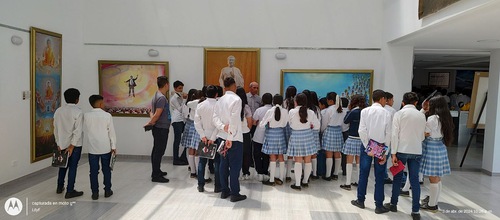 Students of the “New Generation” Educational Institution listening to explanations of the paintings
Students of the “New Generation” Educational Institution listening to explanations of the paintings
Several schools and educational institutions also visited the exhibition, including the Montessori School and the New Generation Educational Institution.
Exhibition Visitors Express Sympathy for Falun Dafa Practitioners
For many visitors, this was the first time that they had learned about Falun Dafa and the CCP’s brutal persecution of people who practice this faith. They found the exhibition informative and expressed their sympathy for the practitioners undergoing abuse at the hands of their government.
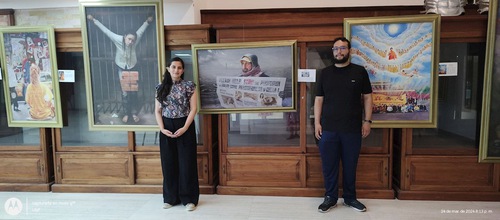 Diana Consuelo (left) and Leonardo Moreno (right)
Diana Consuelo (left) and Leonardo Moreno (right)
Diana Consuelo Isaza Cortés is a pharmaceutical chemist, and Leonardo Moreno is a psychologist who teaches at a university. They were very moved, as the exhibition helped them see how the social transformation that has taken place in China, from the communist revolution to the present day, has affected spiritual practices.
The persecution of Falun Dafa practitioners was totally unknown to them. Consuelo said, “‘The Fortress’ painting awakened my conscience because of the kind of methods the CCP uses to suppress the expression of spirituality in Falun Gong practitioners.”
Visitors Omar and Yolanda left a comment in the exhibition guestbook thanking the organizers.
“This wonderful exhibition reflects and highlights the cruelty and misery in which the Chinese Communist Party is putting its people through, and with it, other nations of the earth. Thank you for opening our eyes to so many situations that we ignore, that by raising awareness we have tools to defend so many innocent people who have been tortured and murdered.”
Elise Susan Inos, a Boston-based nurse, was visiting Colombia on her vacation. She affirmed that a spiritual reality was conveyed in each painting. This is the first time she heard about the practice of Falun Dafa, and she found it to be a “very important” and “very good” meditation practice.
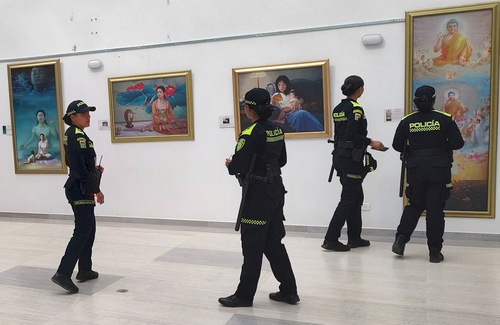 A group of young police officers appreciate the ability to visit the exhibition.
A group of young police officers appreciate the ability to visit the exhibition.
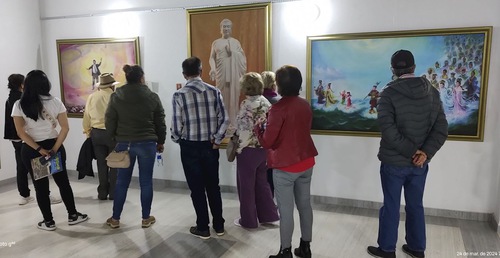 Visitors appreciate the exhibition.
Visitors appreciate the exhibition.
Exhibition in Medellín, University Students Admired
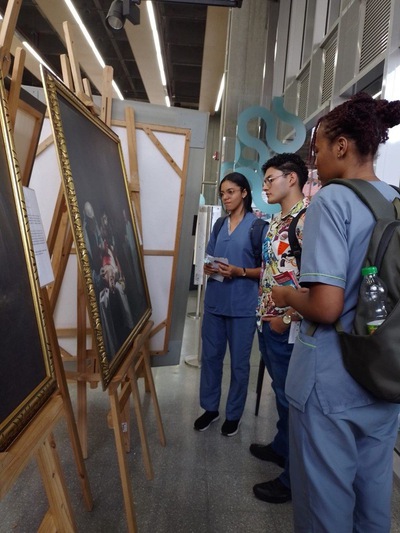 The Art of Zhen Shan Ren Exhibition was held at the Cooperative University of Colombia, Medellín Campus, on April 1-20, 2024.
The Art of Zhen Shan Ren Exhibition was held at the Cooperative University of Colombia, Medellín Campus, on April 1-20, 2024.
Medellín is the second most important city in Colombia and is considered the industrial and commercial capital of the country. The Cooperative University has a presence in 117 cities, and has 36,000 students throughout Colombia. During the exhibition, approximately 2,500 people attended, the majority of which were students and teaching staff.
Many were surprised to learn of the persecution to which Falun Gong practitioners are subjected, since in Colombia, freedom of religion is protected by law.
Maria Camila Arias, a medical student, said that the exhibition was very realistic and very strong, as it showed a reality that is little known in her environment.
The artwork that caught her attention the most was “We Come for You.” She said, “I feel that this work is the one that most reflects the purpose that they have, as well as the vision that they have, so to speak, of their religion.” In her view, the work reflects the compassion that practitioners show for their peers.
On the persecution, she said that she finds it sad that the government would start a conflict over a basic human right, “something that could be so simple, if we put life first in mind.”
Julian Camilo Mondragón, a psychology student, said that the painting “The Sadness of an Orphan” seemed very shocking to him, because of the sadness it conveys in the face of the orphan who’s lost her parents to the persecution.
Alejandro Yarce, who is a software engineering student, was struck by the fact that many of the works depicted very tragic events, but despite this, a ray of light could be seen illuminating the scene, which dissipates some of that tragedy.
He was moved by the painting of “Forced Organ Harvesting,” because “despite being one of the strongest graphically, it has a doctor with a face of sadness, as if of regret, reflecting that in the midst of all the murkiness, he still has empathy and humanity.”
Finally, he said that it is very sad to be persecuted for one's ideals, and that one needs to be very brave to, despite so much evil, remain firm with those ideals and still respect them, all of which is worthy of admiration.
Finally, Sharon Betancur, Juan Carlos Loaiza, and Katherin Guzmán, psychology students, chose to take a photo in front of the work “Forced Organ Harvesting,” because for them it was the most controversial, as it generated multiple sensations for its brutal subject matter, but at the same time for its deep realism.
